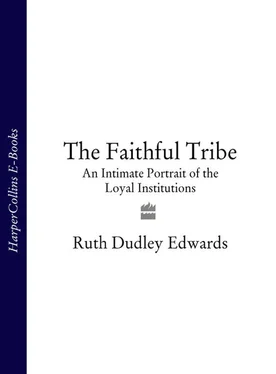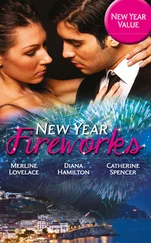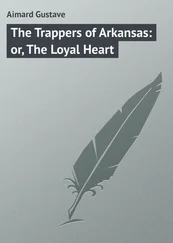I love their dogged varieties of stoicism in the face of the cruel weather. Some sported umbrellas; accordion-players perforce had to wear plastic cloaks to protect their instruments; other defiantly wore shirt-sleeves in downpours that had my contingent whingeing and fighting over our golf umbrella. Not only did they finish the march, but most of them stayed in Edenderry, with little to amuse but hamburger and fish-and-chip stalls, and a platform of dignitaries. When we left, the officiating clergyman had attracted an audience of only about thirty-five. Everyone else was hanging around hoping that the rain would stop, the mud would dry up and they could do what they normally did – sit on the grass, play music, drink beer and sing, until it was time to regroup and march back the five miles to Belfast city centre.
I love marching along with the parade, which we did after an hour or so in order to get warm. My choice was the Unthank Road Flute Band. And when you get into the rhythm, you understand the importance of military music.
Priscilla and Emily enjoyed themselves in the same way as I did, but Bridget and Gus did not. Bridget hates parades anyway and, like Gus, thought this one militaristic. Neither likes fife-and-drum music. There was some wistful longing for Spanish fiestas or West Indian carnivals. Priscilla caused a rethink by pointing out that this event was greatly similar to the Ancient Order of Hibernians’ St Patrick’s Day parade in New York, with the pipe bands, the IRA veterans and the marching Irish police in Sam Browne belts. It was agreed that because the South was unused to military trappings, it was possible to see militarism where it was not intended. What received general agreement in the end was that the parade was an expression of pride in the community and that is no bad thing.
Tiny signs of tribalism were accentuated by walking down the Falls and the Shankill. The very secular Priscilla suddenly went seriously Protestant in the Shankill Road. Here, she said, were the besieged, not the besiegers; it was a clenched-teeth community. It was a reversion to family type. ‘If there have been Catholics in the family, it has never been mentioned,’ she explained.
Bridget and Emily went slightly the other way, mainly because of their shock at the World Cup-related graffiti. Having been actively involved in World Cup mania in Dublin and having adored the carnival atmosphere, it passed their understanding that anyone in Northern Ireland would not have been on the side of the Ireland team. The comments on the Ireland-Holland match were bad enough: 1690 ORANGEMEN 1–0; 1994 ORANGEMEN 2–0’; ‘PACKIE BUTTERFINGERS LET IT IN THE NET’. ‘But we’d have supported Northern Ireland if they’d got through,’ said the Houricans. ‘Not the point,’ said the newly politicized Priscilla. ‘Being besieged leads to aggression.’ And that was before we saw the comment on the Ireland – Italy match and the Loghlinisland public-house massacre: ‘HOUGHTON HIT THE NET 1–0; UVF HIT THE BAR 6–0’.
Gus felt no tribal signals. He felt more at ease in the Falls simply because there a southern accent would be an advantage, but he was depressed by both roads and the multiplicity of ‘For Sale’ signs, suggesting hopeless attempts to get out.
Everyone loved the people they met from both communities and their great friendliness and were delighted when a Protestant taxi-driver said with pleasure, ‘I wouldn’t have expected youse people from Dublin to come up and wave on the parade.’ Bridget was particularly pleased at the elderly Orangemen who said to her in the field, ‘Wish you were the leader of my lodge.’
A detour on the way home via Crossmaglen yielded an impressive tribute to the British passion for freedom of speech, for signs which I had seen a year ago were still in place: ‘BRITISH TERRORISTS GO HOME’ and, surrounding a sketch of a chap in a balaclava, ‘2ND BATTALION – VICTORY TO THE PROVOS’.
Priscilla has returned to America determined to recommend the event to her Irish acquaintances, and the Dublin contingent is evangelical. A coachload can be expected next year.
3. Aughnacloy, 23 August 1995
As a result of that and other articles about Northern Ireland, I received an invitation out of the blue from a County Tyrone farmer the following year to come to the Clogher Valley, stay at his house and attend ‘the Last Saturday in August demonstration with RBP No. 800’. I didn’t know what he was talking about, but I was so stunned at being invited to anything by an unknown Ulster Protestant that I cut short a highly convivial holiday in Clare. ‘I’m going to some kind of Orange march in the country,’ I said to a Southern Irish friend who worked for peace and reconcilation in Northern Ireland. ‘You must be mad,’ she said. ‘I’d rather cut my throat than go to an Orange march.’
Henry, my host, had decided that it was time – post-Drumcree One – for at least one journalist to attend an ordinary rural parade as a guest of what turned out to be a preceptory of the Royal Black Institution. Determined I should see it for myself and make up my own mind about it, he gave me little briefing the night before. At around nine the following morning, after his mother had provided us with a vast Ulster fry, * we drove to the little village of Clogher, six miles from the border. It was cold and intermittently showery: Ulster’s is a cruel climate for a culture whose big festival days occur in the open air.
I was led first into the Orange Hall which was shared by what I now knew to be the Royal Black Preceptory and Henry showed me around. A two-storey house, it was dingy, plain and furnished in a decidedly spartan fashion with hard seats and rough trestle-tables. There was a picture of the Queen downstairs and another upstairs, a ceremonial sword and a plush seat for the Worshipful Master. The lavatory and kitchen were tiny and cheerless and there was no hot water. Men rushed in and out exchanging greetings, removing coats and putting on what I thought were black sashes but which are called collarettes, bowler hats and white gloves. The Blackmen, † as they are generally known, pride themselves on being well turned out: indeed, the only daft thing that Henry has ever said to me he said later that day. When he observed on parade a contingent from south of the border who were wanting in the white-glove department, he shook his head and said, ‘Look at them poor craturs there. If we’d been in a United Ireland we’d all be in that state.’
After introducing me to some of his brethren, Henry dispatched me with instructions to wait across the road from the hall, watch them parade round the village and then proceed to the coach to travel to the main parade. Then they assembled, their band struck up and they processed up the village and round and down, watched by no more than perhaps a dozen or so people along the way.
In the coach I was seated next to the Worshipful Master who said he hoped I would come to tea in the hall afterwards and suggested that if I enjoyed a nip of whiskey, I might like to accompany him to the pub afterwards. My enthusiasm for this notion sealed our friendship, and for the rest of the journey we talked about his family. (Ulster people are so cautious of causing affront by seeming nosy that they rarely ask personal questions; during interviews on countless occasions someone would say in response to a question about his religion, ‘I don’t know what your faith is and I wouldn’t ask but I hope I’m not giving offence,’ before going on to say something completely innocuous about his particular religious beliefs.)
Summing up the day in a newspaper article, I wrote:
The Clogher Valley people – who were extraordinarily welcoming – have since been described to me as among the most decent people in Northern Ireland. Dungannon, the local council, is working well on a system of power-sharing between the Ulster Unionists and the SDLP. As one council member explained: ‘For most purposes it’s us and the SDLP [John Hume’s party] against the fascists – the DUP [Ian Paisley’s party] and Sinn Féin.’ * And there were many Catholics among the more than 20,000 people who picnicked in cars along the parade route. †
Читать дальше












